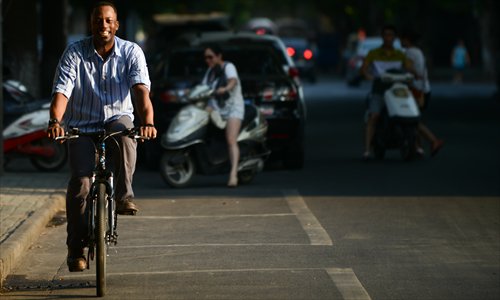Third-tier expats
The lives of foreigners in China’s less developed cities

Most expats living in China's small cities work in the English teaching industry. Photo: IC
For three years now, 27-year-old Danno (pseudonym), originally from the US, has plied his trade as an English teacher in a small county subordinated to Baoding in the middle of Hebei Province.
Although Baoding is a thronging metropolis in its own right, with a population of more than 11 million people according to the most recent census, its status as a third-tier city makes it an unlikely destination for most foreigners.
Indeed, insofar as he is aware, Danno is one of only four foreigners in the county where he lives.
"Can you imagine Chinese people constantly yelling 'hello' at you every single day for three years?" Danno asks rhetorically. "Sometimes I even dread [going out] to do something as mundane as going shopping for groceries. I feel like an animal at a zoo."
The classification of cities in China by tiers is based on a long list of criteria, taking into account GDP, residents' average annual income, industrial capacity, foreign investment and infrastructure. First-tier cities, like Beijing and Shanghai, are the most developed areas, according to these criterion. In third-tier cities like Baoding, school-aged children are brought up with the belief that to move up in the world is to move to China's first-tier cities or abroad, where better prospects and a more exciting life await them.
There are neither authentic Western restaurants nor a single Starbucks in Danno's county.
Nevertheless, on account of intense competition for jobs in first-tier cities, more and more foreigners are moving to China's second and third-tier cities, where there can be better opportunities, according to an April 2013 report in British newspaper The Telegraph.
Danno said his reason for moving to Baoding was to escape the expat bubble, and to experience a part of China that few foreigners do.

An expat cycles on a street in Jiaxing, a third-tier city in Zhejiang Province. Photo: CFP
A more tranquil life
According to a 2013 article in Chinese business magazine CBN Weekly, there are 19 first-tier cities, 36 second-tier cities, and 72 third-tier cities in China.
Danno said that when he first arrived in Baoding three years ago, he knew little about the place other than what he had read on Wikipedia.
Baoding is the first and only city he has lived in China. "To be honest, there was no real reason to choose Baoding specifically - I do remember thinking, 'Wow, it's pretty close to Beijing,'" but I've only been to Beijing to see its culture and history, not its night clubs and bars."
He originally planned to stay for only one year, but after his first year, decided that his stress-free lifestyle in Baoding with plenty of leisure time to travel around the country was too good to abandon.
As an English teacher at a public middle school, Danno is able to support himself working 20 hours a week. In his spare time, he likes conversing with his Chinese colleagues and friends and going to the gym.
"Pretty boring, right?" he said.
On social networking website reddit.com, discussions about life as an expat in second- and third-tier cities in China suggest that Danno is not alone in wanting to live in a smaller city for a healthier, less frenetic pace of life.
One member, using the nickname "tn18947" asked for suggestions for second and third-tier cities that are not too polluted while still having reasonably modern housing. The member wrote that he had lived in Beijing before but was "too scared of the toxic death to return to one [of] the megacities."
Other users suggested the southeastern coastal town of Xiamen in Fujian Province, Zhoushan in Zhejiang Province and Qingdao in Shandong Province.
Another Reddit user, an Australian man in his 40s who asked to be identified only as David, said that he moved to Taizhou, a third-tier city in Zhejiang in 2012, after hearing from a friend that the lifestyle there was more relaxed than larger cities.
After losing his job in IT in Australia, David considered going to Taiwan or cities in Japan to teach English. He ended up in Taizhou after receiving a call from a friend who had already been living and teaching in China for six years, and who said there was an opening at the language institute where he taught. His friend also told him that it had a climate similar to Sydney.
David lived in Taizhou for three years, before moving back to Australia earlier this year.
"Had I not had a friend to give me that soft-landing, I'd likely be in Shanghai. My experience and lifestyle would've been very different had I settled in a first-tier city."
David, who teaches five days a week, said in a Reddit post that he had an income of around 10,000 yuan ($1,599 ) per month. But as expenses in Taizhou were also lower, he was still able to save around half that amount.
Difficulties in a third-tier city
David estimated that there were between 100 and 150 foreigners living in Taizhou, a city of 6 million people. He said that he associated regularly with a group of about 15 to 20 expats, most of whom were English teachers.
"[Of those that weren't English teachers], one worked for the Bank of Taizhou, some guys worked in the shipbuilding industry, and another was a quality inspector in a motorcycle factory," he said. "They sometimes play football in the park and had a weekly night in the pub. Many of the guys had Chinese girlfriends so that kept them busy."
One of the challenges of living in a third-tier city is the language barrier.
When David wanted to get a motorbike license, he was told that there were no study guides in English, and he would have to take the test in Chinese. Furthermore, the Chinese officer told him, he didn't even know how to process the paperwork for a foreigner, and suggested that David go to the registration office in the next town.
Following the setback, David made an active effort to learn Chinese. He joined the QQ group for his residential complex and used Google Translate to chat with Chinese people. He used Chinese online retail websites like Taobao with the help of his Chinese friends, maintained a QQ zone in Chinese, and uploaded short videos to Chinese video-hosting platform Tudou.
"I made quite a few Chinese friends though I wouldn't call them close friends," said David, "The language barrier meant that our communication was pretty limited. Most of our social activities revolved around cooking or eating food."
While it is possible to get by without speaking Chinese in large cities like Shanghai and Beijing, in a smaller city, learning Chinese was essential if one didn't want to become isolated, said Danno, who said he was able to speak Chinese to have long conversation.
"My current roommate has been here since August and doesn't even know this surrounding area beyond the route to school and to the supermarket. He has no friends and no one to talk to. It's no one's fault aside from his own," he said.
Jonathan Edwards, managing director of HR consultancy Antal International Shanghai, said that there was no "safety net" for expats living in China's third-tier cities.
"The main advantage of living in a first-tier city for an expat compared to a second [or] third-tier city is convenience and familiarity. Life in Shanghai and Beijing can be very comfortable for an expat… from familiar food, [having] people from your own country, and leisure activities such as sports teams and bars," he said.
"Additionally, if you have a family, there are international schools and international-standard medical care, therefore reducing the perceived risk of moving your family away from home."
Looking to the future
David returned to Australia earlier this year after achieving his goal of coming to China to broaden his horizons. "As I am getting older, it's time for me to concentrate on planning for my retirement so I've come home and I've started my own business."
Edwards said China's smaller cities might be more suited to young expats who are seeking a sense of unfamiliarity and adventure.
"Lots of expats come to [third-tier cities] to see the real China," said Danno. On his days off, he enjoys roaming around his small county documenting the various scenarios from everyday life. He has also made a habit of traveling to the outskirts of the county to areas that even most Chinese residents would not be familiar with.
He said he is enjoying his life in Baoding as much as ever. He has taken up cracking whips with old men, roller skating, and drawing Chinese calligraphy with a large paintbrush on the ground or dancing with the youth.
"I came to escape the drudgery of life in America - get a 9-to-5 office job, get married, have kids, pay off your mortgage and work until you die," Danno said.
"Will I return home? Maybe one day. But for now that's on far off horizon."